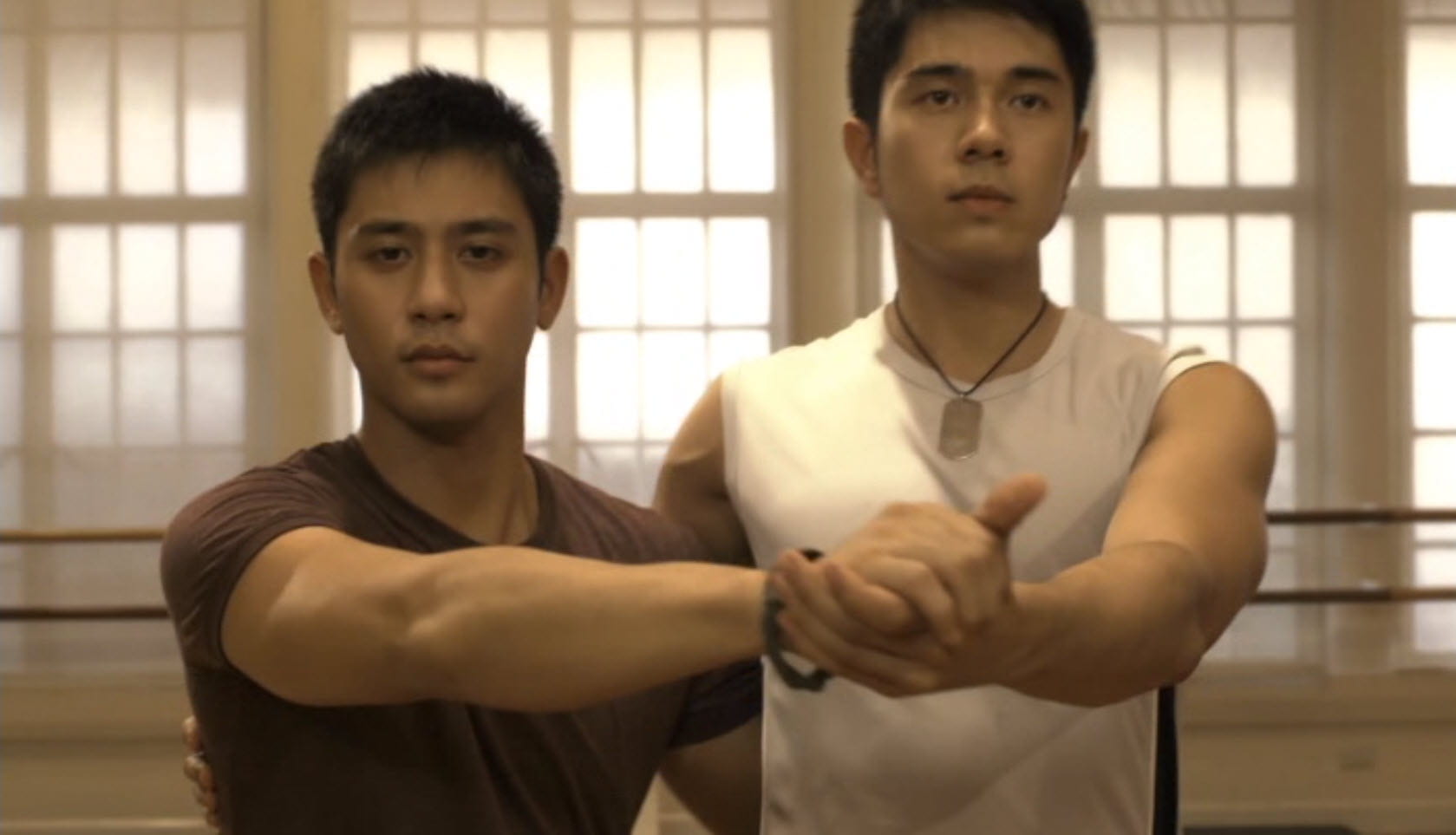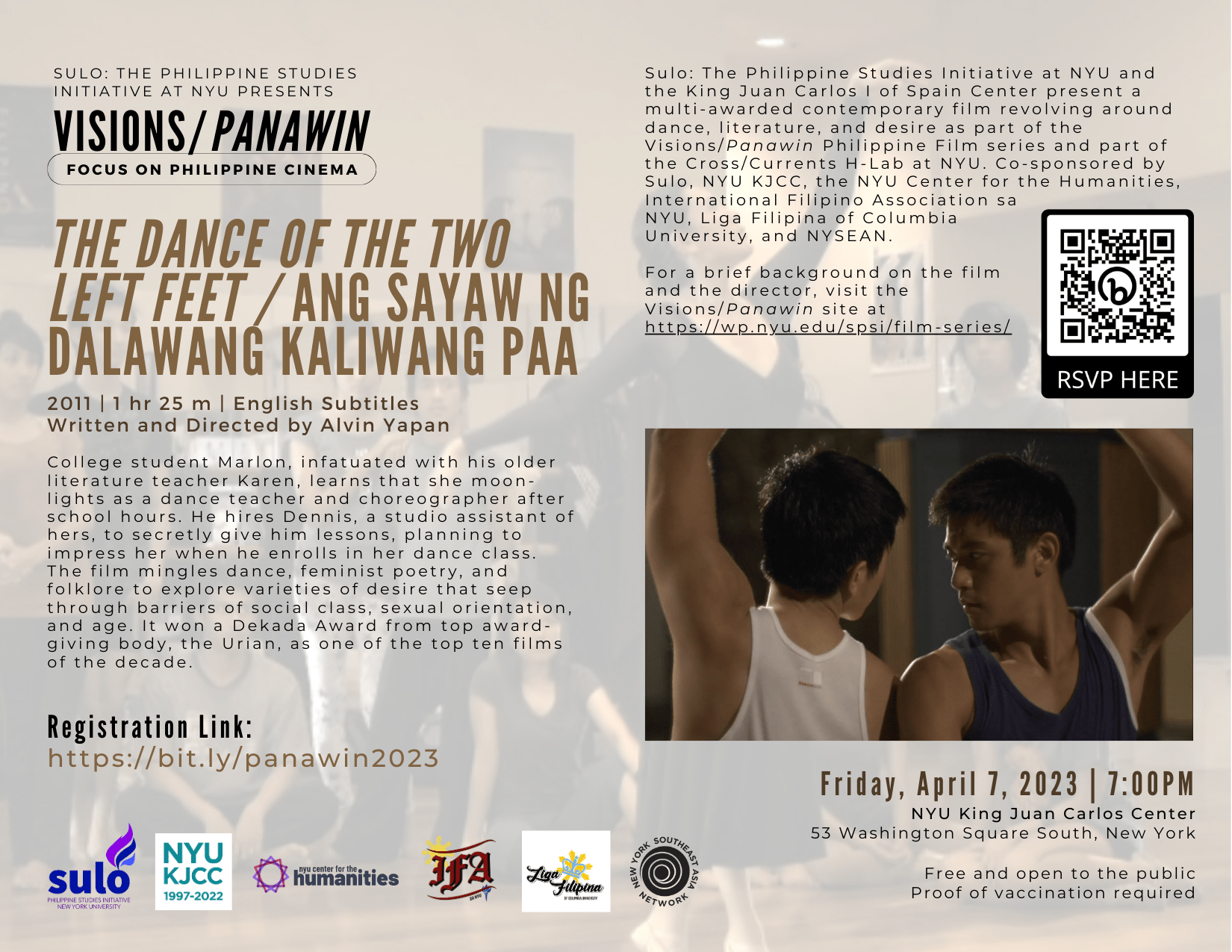2011 | English subtitles | 1 hr 25 m | Written and Directed by Alvin Yapan
Starring: Paulo Avelino, Rocco Nacino, Jean Garcia
Date: Friday, April 7, 2023 | 7:00 pm
Venue: NYU King Juan Carlos Center | 53 Washington Sq S, NYC 10012
Open to the public; proof of vaccination required
RSVP link: https://bit.ly/panawin2023
Synopsis
College student Marlon, infatuated with his older literature teacher Karen, learns that she moonlights as a dance teacher and choreographer after school hours. He hires Dennis, a studio assistant of hers, to secretly give him lessons, planning to impress her when he enrolls in her dance class. The film mingles dance, feminist poetry, and folklore to explore varieties of desire that seep through barriers of social class, sexual orientation, and age. It won a Dekada Award from its top award-giving body, the Urian, as one of the top ten films of the decade.
Notes on the Film
Alvin Yapan and his Sayaw producer Alemberg Ang were both professors of Philippine literature before embarking on distinguished careers as filmmakers. The feminist poems undergirding the film, recited or set to music, attest to the young filmmakers’ acquaintance with the literary scene in the Philippines where contemporary poetry has not caught on as a popular art form. The end credits list half a dozen female poets and the film itself is dedicated in memoriam to the poet Ophelia Dimalanta. Though there is a brief class discussion on the male/female “gaze,” there is nothing particularly “feminist” in the poems, at least in the militant way the word is often understood. But in a country where vernacular poetry has traditionally been the preserve of male writers from its earliest publications by Tagalog poet Francisco Balagtas (b. 1788), the act of a woman fearlessly expressing love, sex, and desire from the female point of view is a feminist act in itself.
Feminist as well, as the film gently suggests, is the life choice of middle-aged Karen (Jean Garcia), one of Sayaw’s trio of protagonists. She lives alone, not dependent on a man for emotional or financial support (as tradition would dictate), having dedicated her life to art and whatever she can give of it to her pupils and neighbors. Nevertheless, she warns two of her students, Marlon and Dennis, at a late-night chat at her place, about the financial perils of pursuing careers in dance. (Such peril is especially dire in an economically-challenged country where art – beyond the showbiz worlds of movies and pop music — is often hardly a priority.)
Alongside poetry, Sayaw focuses on the art of dance as it chronicles the efforts of Marlon (Paulo Avelino) to learn moves that would impress Karen when he enrolls in her dance classes, having failed to do so in her literature classes. He hires fellow lit classmate Dennis (Rocco Nacino) to mentor him secretly. Dennis, whom Karen had enlisted as a dance studio assistant to help him through his financial struggles, welcomes the source of extra funds from the well-off Marlon. There is some conundrum during the initial sessions, as the two guys try to settle who would take the female role. Marlon asks: “Does there always have to be a man and a woman?” As the sessions progress, Dennis’ attraction to Marlon grows but he is unable to directly express it. The situation gets even more complicated when Karen casts them for her dance adaptation of the Ilonggo epic poem Humadapnon. Marlon will play the role of Lord Humadapnon, and Dennis the part of Nagmalitong Yawa, who saves Humadapnon from years-long captivity by a group of women who had bewitched him and kept him in a cave.
Aside from some brief scenes laying out Marlon’s infatuation with Karen, Sayaw elegantly opts to deploy indirection, gazes, gestures, and ellipses to express and address desires, transgressive and otherwise, that are troubling the protagonists. The two most enigmatic scenes in the film are those that show tears, begging for multiple interpretations, catching enigma as it takes flight in some poetic way to clarity of vision.
Notes on the Director
Alvin Yapan established himself in literature before extending his artistic activities to cinema. A number of his works had won prizes at the major literary Carlos Palanca Awards, among them the novel Ang Sandali ng mga Mata/ The Moment of the Eyes; and the short stories “Bomba”/ “Bomb,” “Nostalgia,” and “Nang Gabing Mamatay ang Nana Soling”/ “The Night Nana Soling Died,” which have all been published in book form. He was also a Professor of Philippine Literature at the Ateneo de Manila.
His film career began auspiciously with his first effort, Rolyo/Film Roll (2007), winning both the Cinemalaya and Urian awards for Best Short. He continued his career by entering full-length films, including Sayaw, at the annual Cinemalaya Film Festival, that great incubator of Philippine indie cinema in its method of providing, on a nationally competitive basis, seed funding and visibility to aspiring talents. This system has been a major contributor to what is now called the Third Golden Age of Philippine Cinema, as alluded to by the major 2017 MoMA retrospective: A New Golden Age: Philippine Contemporary Cinema. Other films written & directed by Yapan and co-produced by Cinemalaya and Yapan’s early collaborator Alemberg Ang include Ang Panggagahasa kay Fe/ The Rapture of Fe, Debosyon/ Devotion, and Gayuma/ Pilgrim Lovers. Internationally, Yapan’s films have won awards at the Bogota, Cairo, and World Premieres Film Festivals.
Without too much letup in his film career, Yapan continues as Professor at the Ateneo de Manila, and currently teaches courses in Philippine Epic and Folk Literature, Fiction Studies, Film Practice & Production, and Magic Realism.
– Gil Quito, Curator
Awards
- Urian – Best Picture, Actor (Paulo Avelino), Actress (Jean Garcia), Direction, Screenplay, Music, Cinematorgraphy, Editing, Dekada Award
- Cinemalaya – Best Cinematography, Original Music
- Golden Screen Awards – Best Actor (Rocco Nacino), Actress (Jean Garcia)
- Bogota Film Festival – Bronze Precolumbian Circle
Watch the Trailer

